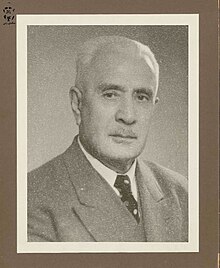Rafiq Hilmi (Kurdish: ڕەفیق حیلمی, romanized: Refîq Hilmî, 1898–1960) was a Kurdish-Iraqi historian, writer and politician born in Kirkuk. He was founder of the Kurdish party Hîwa in 1938 and author of many books on the history of Kurdistan and Kurdish language. After attending school in Sulaimania and Baghdad, he continued his studies at the Military Academy and Technical School of Istanbul.
Rafiq Hilmi | |
|---|---|
 | |
| Born | 1898 |
| Died | 1960 |
| Political party | Hîwa |
| Children | Nahide Rafiq Hilmi |
Literary Life
editEarly in his career he wrote for two Kurdish newspapers: Rojî Kurdistan, the official newspaper of the Kingdom of Kurdistan, and Bangî Kurdistan. He was recognized as a talented literary critic after the second volume of his Kurdish Poetry and Literature was published in 1956. In this work for the first time Goran's poetry and characteristics of the modernist literary movement which he represented were studied and analyzed in depth.[1]
Political life and Hîwa-Party
editRafiq Hilmi is well known in Kurdish politics as the founder of a party called Hîwa (Hope).[2] It was initially a secret organization consisting of Kurdish intellectuals and civil servants. Under the influence of the predominantly Arab faculty in Kirkuk, a student movement called “Darker” (Darker is the Kurdish term for charcoal makers, but was about the Italian term of the “Carbonari”),[3] which later became the Hîwa, was founded and led by Rafiq Hilmi in 1937, which openly acknowledged its great paragons, the Italian fascism under Mussolini and the German National Socialism under Hitler.[3][4] These professors had presented to their students the national unifications that occurred under the rules of the Prince of Bismarck and Camillo Benso, Count of Cavour. Many Kurds saw this as a remarkable example of Kurdish unity.[3] While the political program of Hîwa was a mainly nationalist one and focused on securing autonomy for Iraqi Kurdistan, many members were also leftist-minded.[5] Later, as the opinions and political views within the party became more polarized, the Hîwa Party eventually fragmented. It was divided into two factions: a radical pro-German wing and a more moderate, pro-British wing.[3]
Hîwa also had established links with activists of Komala JK[6] in Mahabad and it sent two army officers Mustafa Khushnaw and Mir Haj Ahmad to the founding ceremony of Komala JK in September 1942. Hîwa maintained its links with Mahabad movement until the collapse of Republic of Mahabad in late 1946.[7]
Books
edit- Kurd le Seretay Mêjûwewe ta kû 1920, (Kurds from the dawn of history to 1920), Mosul, 1934. (in Kurdish)
- Kurdish Poetry and Literature, Vol. I, 1941.(in Kurdish)
- Kurdish Poetry and Literature, Vol. II, 1956.(in Kurdish)
- The History of Kurdistan
- Kurdistan at the Dawn of the Century, 168 pp., New Hope Publishers, 1998. ISBN 91-973354-3-6 (in English)
- The Science of Arithmetic (in Kurdish)
- Yaddasht, Memoirs and the Sheikh Mahmud Revolution, 6 Volumes, Baghdad, 1956-1958. (in Kurdish)
- Summary of the Kurdish Case (The Sévre Treaty)
Footnotes
edit- ^ F. Shakely, The Kurdish Qasida, pp.327-338, in Qasida Poetry in Islamic Asia and Africa, By C. Shackle, S. Sperl, BRILL Publishers, 1996, ISBN 90-04-03587-7
- ^ Blau, Joyce. "ḤELMI, RAFIQ". Encyclopedia Iranica.
- ^ a b c d https://edoc.hu-berlin.de/handle/18452/17192?locale-attribute=en, pp. 169 - 170
- ^ https://youtu.be/nZZGQSoidB4, Information at 51:00
- ^ G.R.V. Stansfield, Iraqi Kurdistan: Political Development and Emergent Democracy, 224 pp., Routledge Publishers, 2003. ISBN 0-415-30278-1 (see p.64)
- ^ The Committee for the Revival of Kurdistan, D. McDowall, A Modern History of the Kurds, I.B. Tauris, 504 pp., 2004, ISBN 1-85043-416-6 (see p.237)
- ^ D. McDowall, A Modern History of the Kurds, pp.290,294